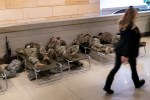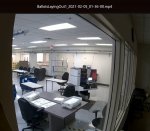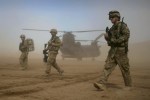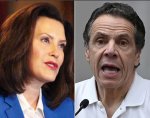Washington state National Guard troops who helped protect the U.S. Capitol complex during President Biden’s inauguration and in the days afterward experienced a COVID outbreak upon returning home, raising questions about why the troops weren’t tested or vaccinated for the virus before they left for D.C. and how many other units and individuals they might have infected while in the nation’s capital.
At last count Thursday night, there were at least eight known positive COVID test results among the Washington state contingent, according to several sources familiar with details of the outbreak, including a spouse of a service member who came down with COVID upon his return from D.C. The eight guardsmen who tested positive worked closely together throughout their deployment, traveling, eating and sleeping in tight proximity to one another.
Spokesmen for several other states’ National Guard bureaus, including those from New Jersey, Nevada and Pennsylvania, declined to say how many of their troops who deployed to D.C. have reported positive COVID cases, citing privacy laws. The lack of transparency after 25,000 guardsmen were called up to provide security for the inauguration is spurring concern that the deployment may have created a superspreader event both in D.C., where thousands of troops remain, and dozens of states when the troops returned home.
“At this time, it is the National Guard bureau’s policy not to give specifics on Guard members who have tested positive for COVID-19,” Amelia Thatcher, a spokeswoman for the New Jersey National Guard, told RealClearPolitics in an emailed statement. “However, quarantine measures and other CDC-recommend standards are being followed, and medical attention will be provided when needed.”
“Our highest priority is to ensure the highest levels of safety, comfort and health protection of our Guard members and their communities,” Thatcher added.
Some spouses of servicemembers who were deployed to D.C. are now questioning that commitment. They want to know why their husbands weren’t tested before they deployed to D.C., a preventative measure that some other states provided.
Viral images of thousands of National Guard troops sleeping in a parking garage in the Capitol complex with access to only one bathroom and two stalls have sparked outrage about the troops’ treatment during their deployment. Top lawmakers from both parties decried the decision to send the troops to the garage, and House and Senate leaders quickly ordered Capitol police to let them back into the Capitol building and congressional offices
“If this is true, it’s outrageous. I will get to the bottom of this,” Senate Majority Leader Chuck Schumer tweeted.
“Just made a number of calls and have been informed Capitol Police have apologized to the Guardsmen and they will be allowed back into the complex tonight,” remarked Sen. Tammy Duckworth, who lost both of her legs in combat. “I’ll keep checking to make sure they are.”
While no clear reason was ever offered for why the troops were ordered to vacate the Capitol and congressional office buildings, one explanation cited was that some troops were not wearing masks while sleeping.
The group that included COVID-infected troops from Washington state had slept largely unmasked in a congressional hallway at least one night, had mingled with several other states’ troops and also interacted with several lawmakers, a guardsman’s spouse told RCP. Several members of Congress and their staff snapped photos and shook the hands of the service members there to protect them in the days and weeks after the Jan. 6 attack on the Capitol.
The Department of Defense did not respond to multiple requests for comment on the COVID outbreak among the National Guard and whether there was a testing protocol – mandatory or simply recommended — that the Pentagon provided to state Guard commanders.
If there was no protocol for all states, each was left to its own procedures, resulting in an inconsistent patchwork of COVID-prevention and screening policies.
Only two states’ National Guard offices – Oklahoma and California – told RCP they had COVID-tested troops before they left for D.C. An Oklahoma spokesman said that the pre-deployment COVID testing turned up several positive results that sidelined those guardsmen and women from being part of the deployment.
Both states said they were aware of just one guard member in each state coming down with COVID after the deployment out of the hundreds of troops each state sent to Washington. California spokesman Jonathan Shiroma also said all personnel were offered their first COVID vaccination before their departure to D.C.
The Oklahoma Guard also tested its troops when they returned, but California did not.
Nevada National Guard spokesman Mikol Kirschenbaum said the bureau followed CDC COVID health guidelines and that all troops had their temperatures checked and completed a screening questionnaire when they arrived to check in at the D.C. Armory.
“Masks and social distancing were required where the missions allowed,” Kirschenbaum said.
When they returned home, the bureau then made rapid tests available and provided “information on what to do if service members present symptoms after they return.”
“For those that were required to stay behind (quarantine and/or isolation), a military support [staffer] has been assigned to stay in DC with them and they are being monitored by medical professionals,” he added.
When first contacted about the COVID outbreak within Washington state contingent, spokeswoman Karina Shagren said she knew of only one service member out of the 400 deployed to D.C. who had tested positive. Informed that the number was at least eight, Shagren said her state bureau is “not tracking an outbreak among Washington National Guard soldiers and airmen who were in D.C.”
“As I mentioned, we performed the usual health screenings before our troops mobilized and returned,” she said. “… We aren’t tracking any requirement to perform COVID tests prior to a domestic mission. Our men and women traveled largely on a military aircraft – and followed the direction provided by the agencies they supported in D.C.”
Shagren also stressed how rapidly the troops were called up for the inauguration mission.
“Within a week, we were asked to mobilize more than 1,000 guardsmen to support law enforcement partners at the state’s and nation’s capital,” she said. “Please understand and appreciate the speed at which we were moving.”
She also said that all of the Washington state troops sent to D.C. slept in hotels, contradicting sources who said they were 100% certain that some of the service members slept in a congressional office hallway inauguration night.
Republican lawmakers in both the House and Senate are demanding to know why the National Guard is retaining a heavy presence in D.C. as the government returns to business as usual. Pentagon officials said Monday that about 5,000 guard members will remain in D.C. through mid-March, when former President Trump’s impeachment trial is expected to end. Some states are deploying hundreds more troops just days after most of the soldiers had returned home.
A coalition of 11 GOP lawmakers, led by Rep. Michael Walz of Florida, sent a letter to Army Secretary John Whitley seeking justification for the ongoing “significant” troop presence. Others are objecting to plans for a permanent fence around the Capitol announced this week by the U.S Capitol Police.
But Democrats are arguing more money is needed to protect lawmakers from ongoing threats of violence, with House Speaker Nancy Pelosi saying Thursday that some of the danger is coming from an “enemy” within Congress. The remark spurred more questions about whom Pelosi was referring to and served as a sign of escalating internal tensions between the two parties since the attack on the Capitol by Trump supporters.
Sen. Tom Cotton penned an op-ed arguing that the National Guard should be allowed to return home. “The National Guard answered the call at a critical time, but its mission is now complete. It’s time to reopen the Capitol Grounds to the American people,” he wrote. “It’s time to send home the troops….
“Despite cold weather and uncomfortable conditions, these soldiers did their duty, in the finest traditions of the Guard. Their presence, coupled with tough federal charges against Capitol rioters, deterred any further violence; the presidential inauguration occurred without incident.”








